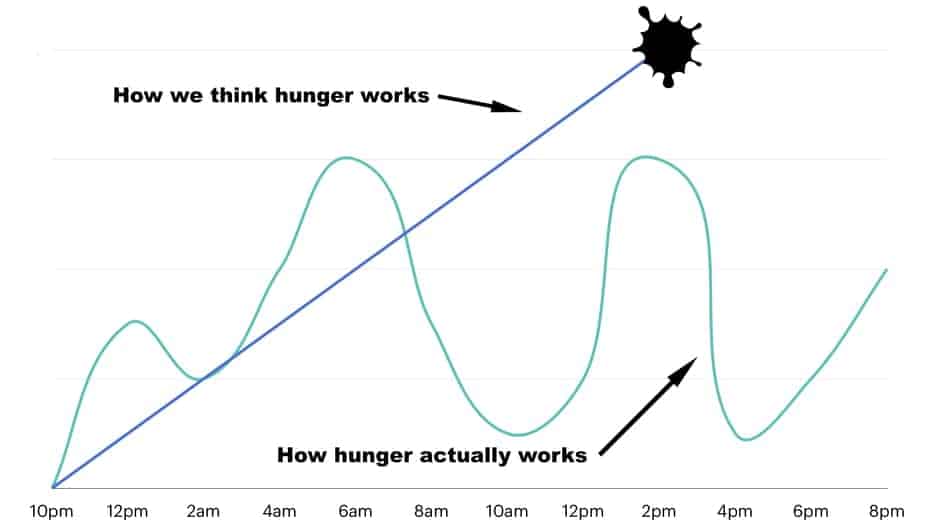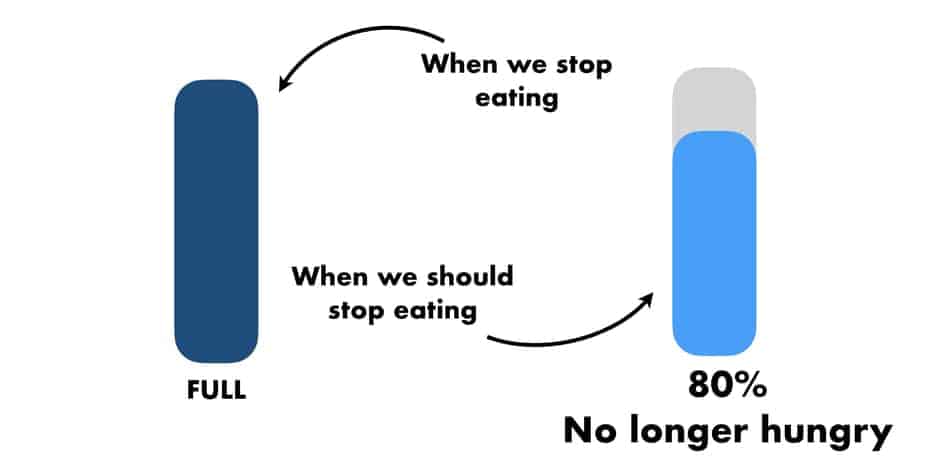A calorie deficit is the only way to create weight loss, regardless of the diet you’re on. And number one reason why people search for something new is they believe this new approach will make them stay in the calorie deficit, without feeling hungry.
In this article I will explain you everything you need to know about hunger and how to be in a calorie deficit without being hungry.
Can you be in a calorie deficit and not be hungry?
You can be in a calorie deficit and not be hungry as long as you focus on how you eat, instead of what you eat. Focusing on how you eat improves satiety, helps to combat appetite, reduces cravings, and over time makes you eat less food, regardless of what you eat.
On the other hand, if you just focus on what you eat you will end up hopping from one diet to another searching for the best solution. Where the real solution is literally in front of your nose.

Does Calorie Deficit Make You Hungry?
Before I show you exactly how to stay in a calorie deficit without feeling hungry, let me first explain a couple of things about hunger.
Does calorie deficit makes you hungry?
Calorie deficit does make you hungry because the longer you stay without the food, you will decrease your leptin (satiety hormone) and increase your ghrelin (hunger hormone). However, levels of ghrelin don’t increase progressively, which means they can change throughout the day.
In other words, just because you feel hungry now, it doesn’t mean you will feel more hungry later.

The levels of ghrelin go up and down throughout the day and are affected by many factors like the pace of your meal (how fast or how slow, food cues from your closest environment, your stress levels, and the food type you eat.
How To Be In A Calorie Deficit Without Being Hungry?
To stay in the calorie deficit and minimize the hunger pangs you need to first focus on how you eat before you worry about what to eat.
Changing how you eat will also change what you eat. On the flip side, changing what you eat will not affect the underlying patterns of how you eat or why you eat.
Here are the 5 ways how you can be in a calorie deficit without being hungry.
Start Eating When You’re Really Hungry
The first step is to be able to identify when you’re physically hungry, and when you just feel like you want to eat. There is a big difference between physical hunger and psychological hunger.
Think of your body as a car that operates on two seperate gas tanks.
- Tank P which is the physical hunger nourishes your physical body with nutrients and it needs to be fueled with food.
- Tank E which is your emotional hunger nourishes your emotions with feelings and it cannot be fueled by food. Food doesn’t feel up this tank so you don’t feel satisfied, even after eating.
The point is that hunger signals coming from the dashboard of tank E show that you have psychological (emotional) needs that aren’t sufficiently met.
And when you cannot distinguish the difference between physical hunger and emotional hunger, most likely you will try to satisfy emotional hunger with food.
But the problem is that no food amount will mute or silence the emotional hunger. Because even when you eat something, you will likely feel “hungry” again.
That’s why people who struggle with overeating, typically cannot tell the difference between physical and emotional hunger.
The best way to get to know your physical hunger and increase the tolerance of it is by doing intermittent fasting when you purposefully don’t eat for several hours. This way you can really feel see the contrast between tank P and tank E.
Once you know how does the “real” hunger feels, your goal is to start eating when you’re physically hungry.
TIP Hunger is not an emergency. It’s just the feeling.
Eat Mindfully Without Disturbance
Next, you need to set up your environment to support your goals. Sometimes it’s easier to change your environment, rather than have strong willpower.
This means your mealtime cannot be done while you’re doing something else. You need to eliminate any distractions like:
- Watching TV
- Smartphones
- Driving car
- Working on the laptop
- Listening to the radio or podcasts
Basically, anything that keeps your mind occupied and distracts from your meal will lead to mindless eating. And when you’re eating mindlessly you’re more likely to:
- Overeat
- Feel hungry sooner
- Eat too fast
Multiple studies show watching TV, listening to the radio, or just doing something else, at the same time while having a meal leads to overeating. Not only that.
People tend to use external cues like the duration of a TV show as an indicator of how long and how much food they should be eating (source).
TIP Pleasant conversations with friends and family are welcome
Spend 20 Minutes For Each Meal
This habit is one of the most critical if you really wanna feel less hungry while being in a calorie deficit. Because it takes 20 minutes for your satiety hormones to work.
People usually when they are distracted cannot focus on their meal. And when they eat mindlessly, they usually eat fast.
But when you eat slowly at your meals, your body will
- Feel fuller for longer
Feel fuller for longer means you will be less hungry long after your meal if you really spend time eating it. The more often you chew your food, relax instead of being rushed and even put the fork down between each bite you give your body time to register your fullness.
- Feel fuller with less amount of food
Because you eat slowly and you spend time for every bite, you will feel full with just half of the amount of food that you eat normally.
This is a great way not only to feel less hungry but to eat less in general. In fact, eating slowly is the number one practice you can do if you want to lose weight without counting calories.
- Kick start digestion
Digestion is a full-body experience. When you eat slowly you giving your body time to adjust and send all the cues to your enzymes and your gut. Not surprisingly, people who eat slowly “magically” get rid of heartburn and indigestion.
- Stimulate olfactory system
The olfactory system is your smell center of the brain. It orchestrates several processes, and one of the most meaningful is taste. This means when you eat slowly, your food will taste so much better. And when you eat real food, eating slowly enhances its taste.
On the other hand, eating slowly junk food taste like crap. Seriously.
TIP Set up a timer for 20 minutes
Stop Eating When You’re Satisfied
Once you already eating slowly, eating without the disturbance and you can differentiate physical hunger from emotional hunger, now it’s time to stop eating when you’re no longer hungry, not when you’re full.

Big difference.
This is the second most important habit you can start doing. Because people usually stop eating when they have either finished everything from their plate, when they run out of beverage or when the show that they watched was over.
Instead, focus on the internal cues. Listen to your hunger and satiety signals and focus on stop eating when you’re satisfied, not full.
Think of it as scale of 1 to 10 where
- 1 is when you feel like you’re the hungriest you’ve ever
- 10 is when you feel like you’re 100% full
Stop eating when you’re satisfied means you finish your meal when you reach to 7/8 out of 10.
TIP This is when you will notice the difference between appetite and hunger. Appetite is wanting to eat and it can happen even after you just finished your meal. Hunger is gone once you’ve eaten.
Stay Physically Active
The last tip is to make sure you’re doing some physical activity with low intensity. Low-intensity cardio helps not only with burning calories. It also helps with suppressing appetite and hunger.
Low duration but regular exercise can really help you stay more in control and combat any hunger pangs that come along. This is also a great way to reduce stress levels. And the high amount of stress can also lead to food cravings.
So you can kill two birds with just one stone.
Don’t worry about doing as much walking as possible. 30-60 minutes daily is plenty.
TIP You can listen to my some podcasts or music while you’re on the walk
How Long Does It Take To Stop Feeling Hungry On A Diet?
Every time when you’re on the diet you will feel hungry. In fact, the main reason why most people are unable to sustain weight loss. Calorie restriction potentially leads to increased hunger levels.
But the longer you stay on the calorie deficit, you can get get used to it.
How long does it take to stop feeling hungry on a diet?
It can take 2-4 weeks to stop feeling hungry on the diet, depending on your hunger tolerance, eating behaviors, stress levels, and types of foods you eat. Some people who have poor hunger tolerance will feel more uncomfortable while dieting which can lead to impulsive eating or binge eating.
- Hunger tolerance
The longer you stay in the fasted state, or in a calorie deficit in general, the faster you will adapt to hunger. First, few days are the worst. The rest comes relatively easy.
The most important step is to identify the difference between physical hunger and emotional hunger. Physical hunger is telling you it’s time to eat. Emotional hunger tells you you want to eat. Big difference.
- Eating behaviors
Also, people who use food as a way to regulate emotions will have lower hunger and discomfort tolerance. This type of eating behavior is hard to spot because it usually happens during emotional distress.
As a knee-jerk reaction to stressful situations, people tend to grab food to calm themselves down.
But, the more often you gonna use food, the harder will it get to lose weight (source). And at this point, doesn’t matter what foods you eat, because the food is not the problem. The problem is the problem.
- Stress levels
An organic way to high-stress response is to find a solution that will calm us down and relax. Some people exercise, some people prefer to socialize, other drink alcohol, and others like to eat.
This is a normal response to reduce stress. But if that habit gets embedded so deeply that is out of control, we always gonna have a hard time losing weight.
- Food types
Foods like proteins that are rich in amino acids seem to respond best with the post-meal ghrelin response.
This means amino acids have been found to suppress ghrelin levels more rapidly and effectively than fats or glucose (source).
This means the feeling of fullness that we have after the meal will happen quicker, and for long after we eat a diet high in proteins.
Does Being Hungry Mean You’re Losing Weight?
Hunger signals can feel uncomfortable at the beginning. But the fact that something is comfortable or not is subjective. Because this will all depend on your hunger tolerance. And the more often you practice not eating or eating less, you will get better at it.
Does being hungry mean you’re losing weight?
Being hungry is a clear indicator that you’re in a calorie deficit and the longer you can stay there without falling off the wagon, the better your results. However, the main focus should be on being able to differentiate physical hunger from psychological hunger.
Does Being Hungry Mean You Need Calories?
Also, because we are living in times where food is in the abundance, not many people actually can recognize their actual hunger. I mean, you just throw a rock and you hit a food truck or a food court. Especially in the bigger cities.
So feeling real hunger may feel foreign to many people. Because we are drowning in food, we don’t even know how does it feel without it anymore.
Does being hungry mean you need calories?
Being hungry doesn’t mean you need calories because hunger is just a signal of hormonal changes. Ghrelin (hunger hormone) is predominantly secreted from the stomach and can be influenced by external food cues, meal anticipation, and time from the last meal.
Which means it’s just a messenger. It’s got nothing to do with needing more calories. Our body is extremely adaptable. Almost like plastic gum.
If you eat more food, it will store the rest of calories. If you eat less food, it will start to using the stored supply.
Does Being Hungry Makes You Healthy?
Being hungry doesn’t make you healthy because hunger is not an indicator of good health. However, being hungry is the result of a calorie restriction. Being in a calorie restriction helps to lower glucose levels, improves lipid oxidation, improves insulin sensitivity and longevity.
Conclusion
Being hungry and calorie deficit goes hand and hand. But there is a difference in perception versus the reality of how does the actual hunger feels and, subjectively, hunger may feel uncomfortable to many people.
However, hunger tolerance can be trained. And the only way to do it is by getting yourself out there, experiment, and try different approaches.
